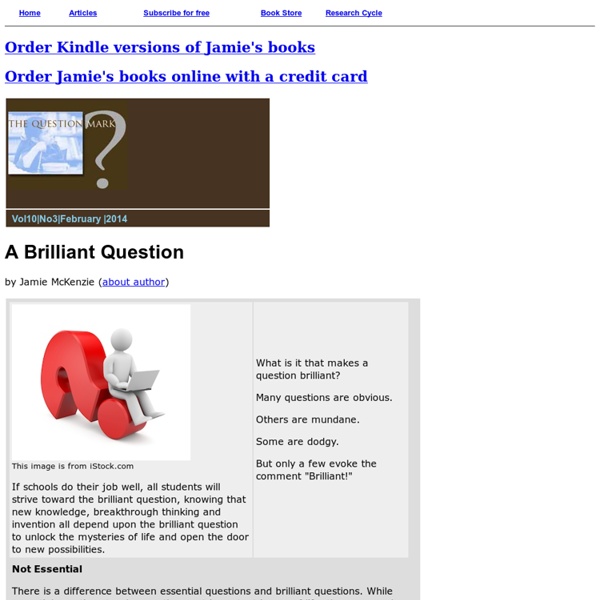Welcome to Zunal.Com
Bringing Inquiry-Based Learning Into Your Class
In the shallow end of the Types of Student Inquiry pool, Structured Inquiry gives the teacher control of the essential question, the starting point—for example, “What defines a culture?” or “What is the importance of the scientific method?” These questions are not answered in a single lesson and do not have a single answer, and, in fact, our understanding of an essential question may change over time as we research it. In Structured Inquiry, the teacher also controls specific learning activities, the resources students will use to create understanding, and the summative assessment learners will complete to demonstrate their understanding. In Controlled Inquiry, the teacher provides several essential questions. Learners unpack several resources predetermined by the teacher to provide valuable context and rich meaning relative to the essential questions. How Are the Types of Student Inquiry Helpful? Inquiry is most successful when strongly scaffolded. Second, think big and start small.
Questions of Import
Difference of Opinion Some questions matter more to some than others. Significance is defined to some extent by personal issues, tastes and interests. Several people looking at the image below might pose very different questions. Some might pose questions about media, media coverage and media literacy. Others might be intrigued by Michael himself and the drama surrounding his passing. Awakening a Sense of Import In some cases, young students may not recognize the import of an image, a poem or a set of numbers. The painting mentioned in the sample lesson above, "Four Boys on the Beach" by Winslow Homer, is a case in point. The boys' body language may be a matter of import but young students may not naturally fix their attention on how the boys are sitting. By definition, questions of import are intended to explore meanings. Making School and Learning Important
Many, Many Examples Of Essential Questions
by Terry Heick Essential questions are, as Grant Wiggins defined, ‘essential’ in the sense of signaling genuine, important and necessarily-ongoing inquiries.” These are grapple-worthy, substantive questions that not only require wrestling with, but are worth wrestling with–that could lead students to some critical insight in a 40/40/40-rule sense of the term. I collected the following set of questions through the course of creating units of study, most of them from the Greece Central School District in New York. Or maybe I’ll make a separate page for them entirely. See also 8 Strategies To Help Students Ask Great Questions Many, Many Examples Of Essential Questions Decisions, Actions, and Consequences What is the relationship between decisions and consequences? Social Justice What is social justice? Culture: Values, Beliefs & Rituals How do individuals develop values and beliefs? Adversity, Conflict, and Change How does conflict lead to change? Utopia and Dystopia Chaos and Order Creation Sources
50 Questions To Help Students Think About What They Think - TeachThought
contributed by Lisa Chesser Using the right questions creates powerful, sometimes multiple answers and discussions. Aristotle said that he asked questions in response to other people’s views, while Socrates focused on disciplined questioning to get to the truth of the matter. Ultimately questions spark imagination, conjure emotions, and create more questions. The questions asked by a teacher or professor are sometimes more glaringly valuable than the information transferred to the students. If students are the ones gathering that information then they’re the ones learning it and student-driven learning cements lessons into the students’ minds making any lesson more powerful with this strategy. The questions are unrestricted and open the mind up to unfettered thought, perfect for innovation and understanding. See also our 28 Critical Thinking Question Stems For Classroom Use Logical Questions Reflection & Collaboration 1. 2. 3. 4. 5. Self-Reflection 6. 7. 8. 9. 10. Reasoning 11. 12. 13. 14.
Tom March | Working the Web for Education
FILLING THE TOOL BOX
The above ads are generated by Google and FNO does not endorse the products displayed in any manner. From Now On The Educational Technology Journal Classroom Strategies to Engender Student Questioning © 1986 by Jamie McKenzie, Ed.D. and Hilarie Bryce Davis, Ed.D. all rights reserved. Most of the strategies described below have been developed and tested by teachers in Princeton, Madison and elsewhere. As one of the primary goals of education is to develop autonomous but interdependent thinkers, students deserve frequent opportunities to shape and direct classroom inquiry. 1) Beginning A New Unit (K-12) If a class is about to spend several days or weeks studying a particular topic or concept, traditional practice and unit design gives the teacher primary responsibility for identifying the key questions and the key answers. Try starting a new unit by asking your class to think of questions that could be asked about the topic; "What questions should we ask about the Civil War? 2. 3. 4. 5. 6.
48 Critical Thinking Questions For Any Content Area -
48 Critical Thinking Questions For Any Content Area by TeachThought Staff Critical thinking is the heart and soul of learning, and–in our estimation anyway–ultimately more important than any one specific content area or subject matter. It’s also an over-used and rather nebulous phrase — how do you teach someone to think? Looking for more resources to teach critical thinking? What Is Critical Thinking? This question is what inspires the creation of seemingly endless learning taxonomies and teaching methods: our desire to pin down a clear definition of what it means to think critically and how to introduce that skill in the classroom. This makes critical thinking questions–well, critical. “To think critically about something is to claim to first circle its meaning entirely—to walk all the way around it so that you understand it in a way that’s uniquely you. A Cheat Sheet For Critical Thinking It’s a willingness and ability to question everything.



